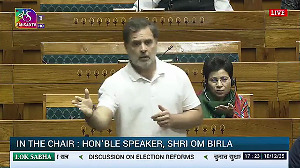"The US and the Europeans have sent that message to Iran for weeks and China and Russia are now doing the same," US State Department Spokesman Sean McCormack said. "We are working very closely with Russia, China and France and Britain on sending a clear message to the Iranians," he said on Monday.
"Ultimately, given Iran's track record on seeking nuclear weapons under the cover of a civilian programme, defying the international community, bobbing and weaving, obfuscating, that we're ultimately all going to end up in the Security Council on this issue," McCormack said.
"I think that the Chinese are perfectly capable of delivering their own messages," he said, adding "What we have been doing, have done and will continue to do, is to continue to work with them, work with the Russians and others so that Iran receives a clear, consistent, unmistakable message from the rest of the world."
There has been no single unified communication from Security Council members to Iran, such as a formal letter of warning but each of the five permanent members of the Security Council have sent strong messages to Tehran asking it to halt plans for nuclear fuel research and start talks with European nations, an unnamed senior official said.





